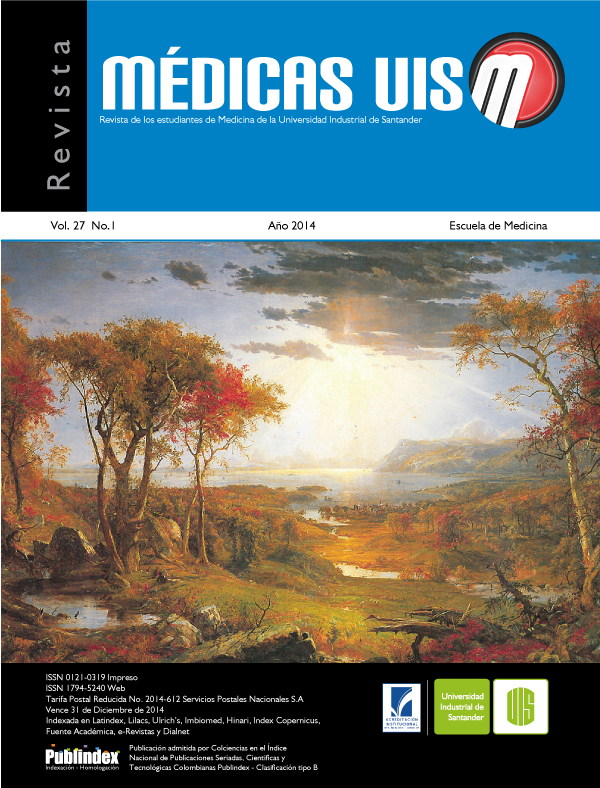Abstract
Inborn errors of metabolism represent a paradigmatic group in the context of little known diseases, although more than 500 well-defined. Thanks to advances in molecular biology and biochemistry, many of these diseases have been characterized not adding to the group of inborn errors of metabolism. Knowledge of the molecular basis of these diseases, enhanced the possibilities of prenatal diagnosis and neonatal risk in the population, allowing the possibility of implementing preventive management programs, as well as the implementation of early treatment and genetic counseling. The case of a 17 -year mental retardation and myoclonic epilepsy progressive degenerative with findings in neuroimaging disease white matter associated with metabolic abnormalities are reported, which is consistent with a picture of glutaric aciduria type 1, this diagnosis is supported in the patient, by the favorable therapeutic response. In addition to this report, seeks to analyze through a review of literature, the diagnostic and therapeutic approach that allows considering the inborn errors of metabolism, such as those increasingly common diseases in medical practice, which require a multidisciplinary approach. (MÉD.UIS. 2014;27(1):69-74)
References
2. Martín MJ, Legrada M, Dalmau J. Errores innatos del metabolismo: aproximación diagnóstica en Atención Primaria. Bol pediatr. 2007;47:111–5.
3. Martín E, García MT, Bustos G. Enfermedades congénitas del metabolismo en el período neonatal (I). Generalidades. Acta pediatr esp. 2006;64(8):391-5.
4. Baldellou A. Presente y futuro en el tratamiento de los errores congénitos del metabolismo.Pediatr Integral.2002;6:721-31
5. Moeschler JB, Shevell M; American Academy of Pediatrics Committee on Genetics. Clinical genetic evaluation of the child with mental retardation or developmental delays. Pediatrics. 2006 Jun;117(6):2304–16
6. Moog U. The outcome of diagnostic studies on the etiology of mental retardation: considerations on the classification of the causes. Am J Med Genet. 2005 Aug;137(2):228–31
7. Garcia-Cazorla A, Perez-Dueñas B, Pineda M, Artuch R, Vilaseca MA, Campistol J. Orientation of mental retardation from neurometabolic diseases. Rev Neurologia. 2006 Oct;43 Supl 1:S187-92.
8. Nassogne MC, Héron B, Touati G, Rabier D, Saudubray JM. Urea cycle defects: management and outcome. J Inherit Metab Dis. 2005;28(3):407-14.
9. Gardeitchik T, Humphrey M, Nation J, Boneh A. Early clinical manifestations and eating patterns in patients with urea cycle disorders. J Pediatr. 2012 Aug;161(2):328-32
10. Garcia-Cazorla A, Wolf NI, Serrano M, Moog U, Pérez-Dueñas B, Póo P, et al. Mental retardation and inborn errors of metabolism. J Inherit Metab Dis. 2009 Oct;32(5):597-608
11. Velázquez A, Vela-Amieva M, Cicerón-Arellano I, Ibarra-González I, Pérez-Andrade ME, Olivares-Sandoval, et al. Diagnosis of inborn errors of metabolism. Arch Med Res. 2000 Apr; 31(2):145-50.
12. Gropman A. Imaging of neurogenetic and neurometabolic disorders of childhood. Curr Neurol Neurosci Rep. 2004 Mar;4(2):139–46
13. Pearl PL, Bennett HD, Khademian Z. Seizures and metabolic disease. Curr Neurol Neurosci Rep. 2005 Mar;5(2):127-33
14. Strauss KA, Puffenberger EG, Robinson DL, Morton DH. Type I glutaric aciduria, part 1: Natural history of 77 patients. Am J Med Genet. 2003 Aug;121c(1):38–52.
15. Singh S, Chowdhury V, Dixit R, Prakash A, Agarwal A. Glutaric Aciduria Type I: A Case Report. Ind J Radiol Imaging. 2006;16(4):723-6
16. Kölker S, Christensen E, Leonard JV, Greenberg CR, Boneh A, Burlina AB, et al. Diagnosis and management of glutaric aciduria type I – revised recommendations. J Inherit Metab Dis. 2011 Jun;34(3):677-94
17. Fu Z, Wang M, Paschke R, Rao KS, Frerman FE, Kim JJP. Crystal structures of human glutaryl-CoA dehydrogenase with and without an alternate substrate: structural bases of dehydrogenation and decarboxylation reactions. Biochemistry-US. 2004 Aug;43(30):9674–84
18. Lindner M, Kölker S, Schulze A, Christensen E, Greenberg CR, Hoffmann GF. Neonatal screening for glutaryl-CoA dehydrogenase deficiency. J Inherit Metab Dis. 2004;27(6):851–9
19. Kamate M, Patil V, Chetal V, Darak P, Hattiholi V. Glutaric aciduria type I: A treatable neurometabolic disorder. Ann Indian Acad Neurol. 2012 Jan;15(1):31-4.
20. Gonzáles-Lamuño D, Couce ML, Bueno MA, Aldámiz-Echevarría L. When rare diseases become urgent: inborn errors of metabolism in primary care. Aten Primaria. 2009 Apr;41(4):221-6
21. Baxter P. Epidemiology of pyridoxine dependent and pyridoxine responsive seizures in the UK. Arch Dis Child. 1999 Nov;81(5):431-322. Tein I. Role of carnitine and fatty acid oxidation and its defects in infantile epilepsy. J Child Neurol. 2002 Dec;17 Supl 3:3S57–82
